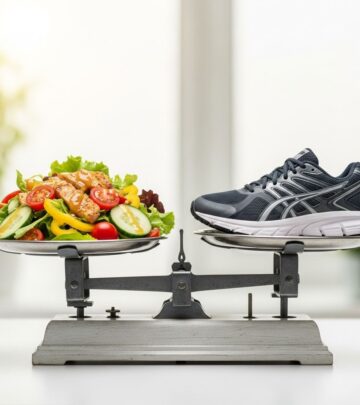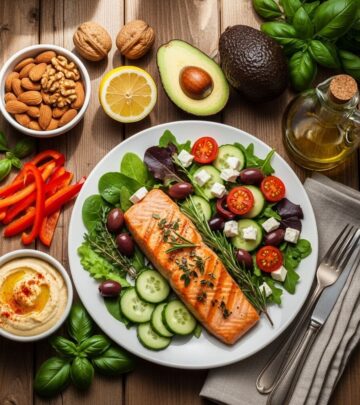What To Do After Eating Too Much Sugar: Recovery Tips and Next Steps
Overcome the effects of a sugar binge with practical, dietitian-recommended recovery steps and get back to balanced eating.

What To Do If You Ate Too Much Sugar: A Practical, Science-Backed Guide
Most people have experienced a night—or a holiday—where they ate more sugar than planned. Maybe it was an extra slice of birthday cake, a couple of candy bars, or too many cookies after dinner. If you’re waking up the morning after with discomfort, guilt, or questions about how to recover, you’re not alone. Below, discover practical steps for what to do after a sugar overload, why it happens, how it affects your body, and the best ways to get back to feeling your best.
Contents
- Why Too Much Sugar Matters
- Immediate Effects of Eating Too Much Sugar
- First Steps: What To Do Immediately After Eating Too Much Sugar
- Building Healthy Habits After a Sugar Binge
- Long-Term Strategies To Manage Sugar Intake
- Frequently Asked Questions
Why Too Much Sugar Matters
Sugar is a natural part of many foods. But added sugars—the sugars and syrups put in foods during processing or preparation—can quickly add up, especially in desserts, sodas, candies, and sweetened cereals.
According to established guidelines, adults should limit added sugar intake to less than 10% of total daily calories, and experts suggest even less for optimal health. Eating excessive amounts of added sugar regularly may contribute to:
- Weight gain or difficulty maintaining a healthy weight
- Increased risk of type 2 diabetes and prediabetes
- Elevated triglycerides and lower HDL (“good”) cholesterol
- Dental cavities
- Blood sugar swings, potentially leading to energy crashes
Immediate Effects of Eating Too Much Sugar
The morning after a sugar binge, you might notice some short-term effects such as:
- Bloating or gastrointestinal discomfort
- Headache or sluggishness
- Increased thirst or dehydration
- Heightened cravings for more sugar
- Feelings of guilt or anxiety about your choices
These reactions are normal and generally not harmful after a single episode. What matters most is how you respond and take care of yourself moving forward.
First Steps: What To Do Immediately After Eating Too Much Sugar
Don’t panic or feel guilty. One night of excess sugar won’t derail your health; what matters most is your overall pattern of eating.
Hydrate With Water
One of the most effective ways to help your body recover is to drink plenty of water. Excess sugar can draw water into your digestive tract, leaving you feeling thirsty. Hydration aids your kidneys in processing excess sugar and supports digestion.
- Start your morning with a large glass of water.
- Aim for at least 8 cups (64 ounces) throughout the day; listen to your body’s thirst signals.
Eat a Balanced Breakfast
Rather than skipping breakfast out of guilt or to “make up for” last night, focus on stabilizing your blood sugar with a meal that offers:
- Protein (such as eggs, tofu, Greek yogurt, or nut butter)
- High-fiber carbohydrates (like oats, berries, or whole-grain toast)
- Healthy fats (such as avocado or seeds)
This combination helps sustain energy levels and curbs further sugar cravings.
Move Your Body
Gentle activity can boost your mood, aid digestion, and help regulate blood sugar. Consider:
- Taking a walk after your meal (even 10-15 minutes helps)
- Stretching or light yoga
Don’t Try to “Detox”
There’s no need for extreme measures or harsh cleanses. Your liver and kidneys are constantly working to filter and eliminate excess compounds from your body. Focus on natural, whole foods and let your body’s systems do the rest.
Pause and Reflect on Triggers
If you notice a pattern of sugar overconsumption, take a moment to consider what triggers it. Common reasons include:
- Emotional stress, anxiety, or boredom
- Restrictive dieting followed by rebound cravings
- Lack of sleep or poor meal planning
- Social situations where treats are readily available
Self-awareness can help you plan differently for next time.
Building Healthy Habits After a Sugar Binge
Instead of focusing on restriction or guilt, prioritize positive steps that nurture your body and mind.
Resume Your Normal Eating Pattern
The most important thing you can do is return to your usual healthy habits. Overcompensating by skipping meals or overexercising can create an unhealthy cycle.
- Return to your standard meal and snack structure.
- Include a balance of protein, fiber, and healthy fats at meals.
- Listen to your hunger and fullness signals.
Eat More Fiber-Rich Foods
Fiber slows the absorption of sugar from the digestive tract, stabilizing blood sugar and supporting digestive comfort. Try adding:
- Vegetables such as leafy greens, carrots, or broccoli
- Legumes (beans, lentils, chickpeas)
- Whole grains like oats, barley, or quinoa
- Berries, apples, pears, or oranges
Choose Healthy Snacks
When a craving hits, reach for naturally sweet foods or snacks paired with protein and healthy fats. Examples include:
- Greek yogurt with fresh berries and chia seeds
- Apple slices with almond butter
- Carrot sticks with hummus
- Energy bites made with oats and nuts
Prioritize Sleep
Getting adequate, good-quality sleep helps regulate hormones related to hunger and cravings. Aim for 7-9 hours per night to support recovery and appetite control.
Long-Term Strategies To Manage Sugar Intake
Preventing sugar overconsumption is about building sustainable habits, not following fad diets or deprivation. Consider these evidence-based tips:
- Read Nutrition Labels: Identify hidden added sugars in packaged foods under names like sucrose, high-fructose corn syrup, honey, molasses, and syrup.
- Choose Naturally Sweet Foods: Opt for fruit, especially whole fruit, to satisfy sweet cravings without excessive added sugars.
- Swap Sugary Drinks: Replace soda and sweetened beverages with water, seltzer, or unsweetened tea.
- Cook at Home: By preparing meals at home, you have better control over added sugars, especially in sauces and marinades.
- Flavor With Spices and Extracts: Cinnamon, vanilla, nutmeg, and citrus zest add sweetness and flavor without sugar.
- Adjust Your Recipes: When baking, reduce the sugar called for by 1/3 to 1/2, and add unsweetened applesauce or mashed banana for moisture and sweetness.
- Practice Mindful Indulgence: Allow yourself to enjoy treats on occasion. When you do, eat slowly and savor each bite, paying attention to taste and satisfaction.
| Healthy Swaps for Sugar Cravings | Benefits |
|---|---|
| Fruit salad with cinnamon | Fiber, vitamins, natural sweetness, no added sugar |
| Whole-grain toast with nut butter | Sustained energy from healthy fats and slow-digesting carbs |
| Homemade smoothies with greens | Boost nutrient intake, satisfy sweet cravings naturally |
| Roasted carrots or sweet potatoes | Naturally sweet, rich in fiber and beta-carotene |
Rethink Your Mindset About Indulgence
Remember: enjoying sweet foods in moderation is part of a healthy, balanced lifestyle. Viewing sweets or sugar as “off-limits” can increase cravings and lead to overconsumption. Instead, aim for a flexible approach—most of your choices should be nourishing, but there’s room for pleasure and celebration, too.
Frequently Asked Questions (FAQs)
Q: What’s the best thing to do after eating too much sugar?
Start by hydrating with water, eat a balanced meal with protein and fiber to stabilize blood sugar, and return to your regular eating and activity patterns. Avoid extreme “detox” tactics or skipping meals.
Q: Can one night of eating too much sugar negatively affect my health?
No. While you may feel some discomfort temporarily, a single episode won’t harm your long-term health if you get back to your healthy routine.
Q: How long does it take the body to recover from a sugar binge?
Most people feel back to normal within a day, especially when prioritizing water, fiber, and balanced meals. Lingering cravings can occur if you don’t address underlying triggers.
Q: Should I fast or exercise excessively to offset a sugar binge?
No. Fasting or over-exercising can trigger further overeating and is not recommended. Consistency and balance are key.
Q: How can I prevent future sugar binges?
Eat regular, balanced meals with protein, fiber, and healthy fats. Identify your triggers, manage stress, get enough sleep, and allow occasional intentional sweets so you don’t feel deprived.
Key Takeaways
- One night of excess sugar is not a health emergency. Focus on hydration, fiber-rich foods, and balanced meals to help your body recover.
- Don’t skip meals or resort to extreme measures. Let go of guilt and return to your regular healthy routine.
- Build awareness of your triggers and develop sustainable strategies for long-term balance.
- Allow sweets in moderation—they can be part of an overall healthy eating pattern.
Read full bio of Sneha Tete












